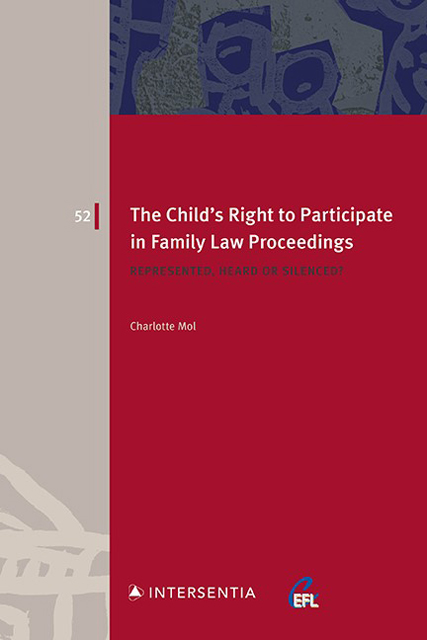Book contents
- Frontmatter
- Acknowledgements
- Contents
- List of Tables and Figures
- List of Abbreviations
- List of International and European Instruments and Sources
- List of Cases
- Chapter 1 Introduction
- Part I The Child’s Right to Participate in International and European Human Rights Instruments
- Part II The Child’s Right to Participate in The Case Law of the ECtHR
- Part III Comparative Remarks and Conclusions
- Appendix: Categorization of Cases Per Type of Proceeding
- Bibliography
- Index
- About the Author
- European Family Law Series
Chapter 8 - ‘Influence’ on the Views of the Child
Published online by Cambridge University Press: 20 April 2023
- Frontmatter
- Acknowledgements
- Contents
- List of Tables and Figures
- List of Abbreviations
- List of International and European Instruments and Sources
- List of Cases
- Chapter 1 Introduction
- Part I The Child’s Right to Participate in International and European Human Rights Instruments
- Part II The Child’s Right to Participate in The Case Law of the ECtHR
- Part III Comparative Remarks and Conclusions
- Appendix: Categorization of Cases Per Type of Proceeding
- Bibliography
- Index
- About the Author
- European Family Law Series
Summary
‘[The applicant] claimed that [the child] had been manipulated by her mother and, as she had hardly had any contacts with him for years, she had not been able to express her own view on access.’
– Applicant in Luig v. Germany (2007)Introduction
A common concern with regard to child participation in family law proceedings is that children may be unduly influenced. In disputes following the separation or divorce of parents the worry exists that children, when asked to express their views, may get caught in the middle and be pressured by their parents to pick a side. In that regard, reference is made to a conflict of loyalties or even parental alienation syndrome. The existence of parental alienation syndrome is a contested topic in the field, but ‘parental alienation’ is a term used to refer broadly to ‘a child who has been influenced to reject one parent’. More nuanced, in the literature parental alienation is mentioned as a phenomenon by which ‘the child becomes hostile to one parent while strongly allying with the other parent, with alienation implying that the aligned parent intentionally created a wedge between the child and her or his other parent’. Parental alienation, in that sense, may be seen as an extreme form of influence.
The question of ‘influenced’ views is one that appears in the case law. The quote above shows one example in which a parent who did not benefit from the child’s participation in the proceedings claimed that the child’s views were influenced or ‘manipulated’ by the other parent. This applicant does not stand alone, as we will see in this chapter, and governments and the European Court of Human Rights (ECtHR) also discuss influence. In that regard, the topics of loyalty conflicts and parental alienation are also raised – by parents, governments and the ECtHR. It is important to note the relationship between the topic of influence and the topics that were at the centre of the previous chapters.
- Type
- Chapter
- Information
- The Child's Right to Participate in Family Law ProceedingsRepresented, Heard or Silenced?, pp. 285 - 314Publisher: IntersentiaPrint publication year: 2022



